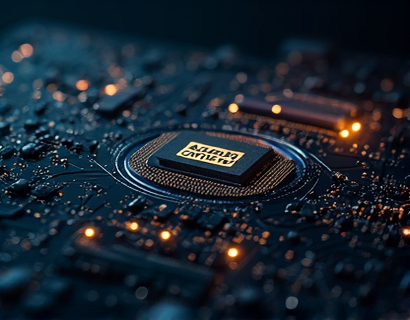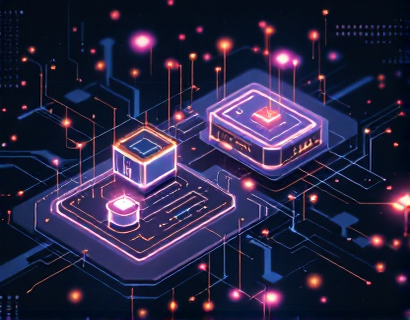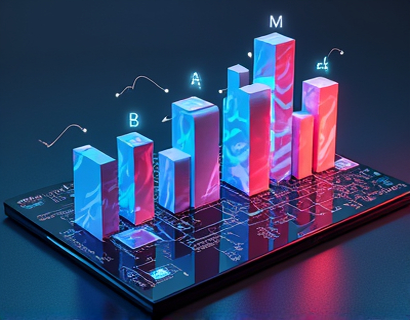Blockchain Oracle Management: Revolutionizing Decentralized Applications with Advanced Data Integration and Smart Contract Solutions
In the rapidly evolving landscape of blockchain technology, the role of oracle management has emerged as a critical component for the success of decentralized applications (dApps). Oracle management involves the integration of external data sources into blockchain networks, enabling smart contracts to access and utilize real-time data. This integration is essential for enhancing the functionality and reliability of dApps, as it bridges the gap between the blockchain's inherent limitations and the vast amount of external data required for complex operations. This article delves into the transformative software solutions that are revolutionizing oracle management, focusing on advanced data integration and smart contract capabilities. By optimizing these processes, the platform discussed herein ensures secure and reliable interactions within decentralized applications, unlocking the full potential of blockchain technology.
The foundation of any decentralized application lies in its ability to interact with both the blockchain and external data sources. Traditionally, this interaction has been a bottleneck due to the complexity and security challenges associated with data integration. Oracles play a pivotal role in this process by acting as intermediaries that fetch data from off-chain sources and relay it to the blockchain. However, the reliance on centralized oracles introduces vulnerabilities, such as single points of failure and potential manipulation. To address these issues, advanced oracle management solutions have been developed, focusing on decentralization, security, and efficiency.
One of the key advancements in oracle management is the implementation of decentralized oracle networks. These networks consist of multiple independent oracles that collectively provide data to smart contracts. By distributing the data sourcing across several nodes, the risk of a single point of failure is significantly reduced. Decentralized oracle networks also enhance transparency and trust, as the data aggregation process is open and verifiable by all participants. This decentralized approach ensures that the data fed into smart contracts is reliable and tamper-proof, thereby increasing the overall security of the dApp.
Another critical aspect of advanced oracle management is the optimization of data integration. Traditional methods of data integration often involve complex and resource-intensive processes, which can lead to delays and increased costs. Modern solutions leverage cutting-edge technologies such as Web3 APIs, HTTP requests, and message queues to streamline data fetching and processing. These technologies enable real-time data synchronization, ensuring that smart contracts have access to the most up-to-date information. Furthermore, the use of efficient data storage solutions, such as IPFS (InterPlanetary File System), helps in reducing storage costs and improving data retrieval speeds.
Smart contracts, the backbone of decentralized applications, benefit immensely from advanced oracle management. By integrating reliable and secure data sources, smart contracts can execute more complex and dynamic operations. For instance, in the context of decentralized finance (DeFi), oracles provide essential data such as market prices, loan rates, and transaction volumes. This data is crucial for automating financial instruments like lending protocols, yield farming, and decentralized exchanges. The accuracy and timeliness of this data directly impact the performance and user trust in these financial applications.
To illustrate the impact of advanced oracle management, consider a decentralized prediction market. In such a market, users can bet on future events, with the outcomes determined by smart contracts. The reliability of these contracts hinges on the accuracy of external data, such as sports scores, election results, or commodity prices. Decentralized oracle networks ensure that the data used in these predictions is sourced from multiple independent nodes, reducing the risk of manipulation and increasing the fairness of the market. This not only enhances the user experience but also fosters greater adoption of decentralized financial systems.
Beyond financial applications, advanced oracle management has far-reaching implications across various industries. In the supply chain sector, oracles can integrate data from IoT devices, tracking the movement and condition of goods in real-time. This data can be used to automate payments, verify authenticity, and ensure compliance with regulatory standards. In the healthcare domain, oracles can fetch real-time patient data from wearable devices, enabling smart contracts to trigger alerts or adjust treatment plans based on predefined conditions. These use cases demonstrate the versatility and potential of oracle management in creating more efficient and trustworthy decentralized systems.
The development of robust oracle management solutions also addresses the challenge of scalability. As the number of dApps and smart contracts grows, the demand for high-throughput data integration becomes critical. Advanced oracle networks are designed to handle large volumes of data with minimal latency, ensuring that smart contracts can process information quickly and efficiently. This scalability is achieved through the use of sharding techniques, where data is partitioned across multiple nodes, and through the optimization of communication protocols to reduce overhead.
Security remains a paramount concern in oracle management. To mitigate risks, advanced solutions implement multi-layered security measures, including cryptographic verification, consensus mechanisms, and regular audits. These measures ensure that data transmitted between oracles and smart contracts is authentic and unaltered. Additionally, the use of zero-knowledge proofs and other privacy-preserving techniques allows for secure data sharing without compromising user privacy. By prioritizing security, these solutions build trust among developers and users, fostering a more robust ecosystem for decentralized applications.
Another significant advantage of advanced oracle management is the reduction of costs associated with data integration. Traditional centralized oracles often charge high fees for data retrieval, which can be prohibitive for smaller projects or developers. Decentralized oracle networks operate on a token-based economy, where oracles are incentivized to provide accurate data through token rewards. This decentralized incentive structure not only lowers costs but also aligns the interests of data providers with the health of the network, ensuring high-quality data inputs.
For developers and businesses looking to leverage the full potential of blockchain technology, integrating advanced oracle management solutions is essential. These solutions provide a seamless and secure way to access external data, enabling the creation of more sophisticated and reliable decentralized applications. By abstracting the complexities of data integration, developers can focus on building innovative features and user experiences, rather than grappling with the intricacies of oracle management.
In conclusion, the evolution of oracle management through advanced data integration and smart contract solutions is transforming the landscape of decentralized applications. By addressing the challenges of security, scalability, and cost, these solutions unlock new possibilities for blockchain technology. As the ecosystem continues to mature, the adoption of robust oracle management systems will be a key factor in the success and widespread acceptance of decentralized systems. For blockchain professionals, understanding and implementing these advanced solutions is crucial for staying at the forefront of the industry and driving meaningful innovation.










































